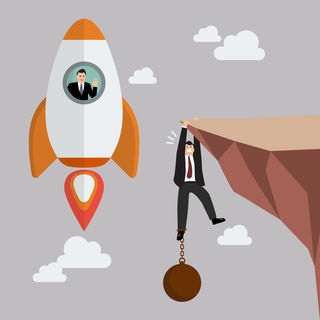Resilience
The "Failure to Launch" Epidemic
In pursuit of parenting perfection, are adults emotionally stunting children?
Posted December 5, 2016

One of the most significant developments in America today is the failure of millions of young people—even those fully employed—to fully launch into adult life. November, for example, brought a report that 45 percent of young adults in New Jersey between the ages 18 and 34 now live with their parents—even though they are employed. Failure-to-launch is the collective name for the difficulties so many young people today are having in assuming the self-sufficiency and responsibilities of adulthood, and it is a rapidly growing problem.
Sometimes anthropology is the best lens for looking at the complexities of contemporary American youth. David Lancy, professor emeritus at Utah State University, is the author of The Anthropology of Childhood, a book The New York Times has cited as the best parenting book one could read, even though it is not remotely like the standard book of advice for new parents, which invariably catalogues everything they need to be worrying about.
One thing Lancy is worried about is failure-to-launch. The symptoms, he insists, first appear in infancy and grow more virulent over childhood. Here is the edited transcript of a recent conversation we had on the topic.
HEM: You are perhaps the world’s leading expert on how children become competent adults. Do you feel like a visitor from Mars or a salmon swimming upstream?
DL: Well, yes. The first epiphany I had was when I was doing my doctoral research in a remote village in Liberia and noticed that kids are treated with what I came to call benign neglect. They're pretty much free to roam, and when they reach a certain age, they do chores, generally willingly, in fact eagerly. There is a seamless transition from make-believe play, when you're pretending to cook or bring water or firewood, to actually doing it. It’s on a small scale and nobody expects too much of you, and gradually you work your way into that regular job every morning. That’s so different from what the world thinks childhood is all about. I coined the term neontocracy to capture the profound differences: In our society kids are on top and in the societies that I studied they're on the bottom. It turns out that in most of the world, kids are on the bottom. Somewhere along the way, kids' needs and desires took precedence here, and I think things have gone downhill from there.
HEM: What do you mean by downhill?
DL: Putting children and their needs first is dysfunctional and irrational. Adults are the breadwinners; they’re creating and running the homes, gathering the food or the money to buy the food. They're far more important to the overall well being of the family than the children are. To put children first is bound to cause stress. You're doing everything to make your children happy and fulfill their needs and encourage them, but you still feel guilty because you really don't like playing with your children, and they sense that. In fact, the children won't be harmed if you don't play with them. But the parent is placed in the difficult situation of making a choice in favor of the child but which may be a bad choice that raises the parent's stress level, which in turns raises the stress level for the whole family, which is not good for kids. You get into a vicious circle.
HEM: Is putting kids first also a recipe for narcissism?
DL: It’s a recipe for failure-to-launch. There are threads that you can trace from infancy to early childhood that lead to poor outcomes. As you have reported, even the kids who are academic or athletic stars are so screwed up psychologically that their futures are impaired anyway. To me that stems from the same basic misunderstanding, willful misunderstanding, of how children would develop without all the attention.
HEM: Willful misunderstanding?
DL: Parents say, “well I really know better, I shouldn't do this with my kids but all the other parents are doing it.” It’s making what you know is probably not a very good decision on behalf of your child. Food and diet issues; acquiescing; giving in to peer pressure. We're allowing children to be influenced by peer pressure at younger and younger ages. In the 1950s, peer pressure wasn’t a significant issue until children were in their mid to late teens; now we've got to talk about it in kindergarten.
HEM: One of the things that got me onto the topic of contemporary parenting, and specifically the counterproductive effects of overparenting, was noticing the dramatic decline in the mental health of college students in 2002. My kids had recently graduated college and their cohort didn't even know where the campus mental health center was. Suddenly, a few years later, everyone is flocking there. I also began noticing a huge judgmentalism on the part of parents. Where did this come from?
DL: One argument you might make is that worshipping your children is a new religion. Somebody ratting on a mother who leaves a perfectly competent child unattended in a playground for a few minutes is analogous to condemning the sinner, looking for transgressions against the creed. It's the equivalent of saying “you're not worthy to belong to our congregation.” The mommy wars for years have been about that. If you're a true believer you've got to homeschool your kids; you’ve got to be 24/7. In the 1970s Benjamin Spock was saying, lighten up, take it easy. At some point we took a 180-degree turn.
HEM: Why?
DL: I am not entirely satisfied with the argument that the critical change is much smaller families later in life.
HEM: Neither am I. I believe that parents also began noticing that the world is changing, became anxious about the success of their children in the new globalized economy, and have been responding in ways that are counterproductive even if they feel intuitively right—they began pushing their children to succeed, typically by hovering over them and taking all the play out of childhood, and they began directly transmitting their anxieties to their kids.
DL: Children are no longer a biological phenomenon. There's a total disconnect between sex and pregnancy, having a child. Money comes into it. Can we afford a child? Having fewer children and having them much later means the investment will be much greater. They have to be perfect. You don’t have any more chances. It's got to fulfill every wish and need you ever had as a parent and as your legacy to the future. It makes people desperate to know what the right way is of doing things and to seek social comfort. Mommy blogging is all about finding your sect, a group of like-minded people so that you can feel comfortable about the way you do things. I feel sorry for parents today. They're worrying too much about their kids and not having enough fun.
HEM: What are the consequences besides failure-to-launch?
DL: A pretty significant one is an effect on the economy. At every level of the economy today, there are shortages of adequately trained workers. Part of the blame is that we make so few demands on children, remove all the obstacles from their lives, and keep telling them how wonderful they are. Further, the whole mental health issue and prescription of psychotropic drugs is spiraling out of control. Again a vicious circle: We're overreacting, overmedicating, which in turn just keeps growing. There's no negative feedback mechanism by which to say, wait a minute, we need to raise the bar a little higher here before we start giving kids drugs. Parents more and more are so anxious about their children being contaminated, polluted by other children who perhaps don't share the same taste and values. So there's increasing segregation, and more parents are spending so much time picking the right soccer club and the right magnet school, charter school. To me a lot of that is making sure they're associated with the right children and not exposed to influences from other perspectives. That reduces diversity because children are brought up with the idea that they're part of a very special group, a very elite group typically, and that's where they belong. They're not there duking it out or interacting with the whole world.
HEM: One of the values of anthropologic research is you get to see that kids can be raised in a whole variety of ways and come out just fine.
DL: We grew up in an era when parents had the attitude that as long as the kids are healthy and decently put together and seem to be OK, leave them alone, they're fine, they'll turn out just fine. Turning out just fine is not a satisfactory objective for middle and upper middle class parents today. The kids have to be optimized. They must achieve everything they're capable of achieving. That's a hell of a burden to put on the kids and the parents too; it's unrealistic. And it's not clear that in the process they aren’t doing some damage to their psyche that can have serious consequences. I was heartbroken when I read in your PT article Crisis U about the University of Pennsylvania student who jumped to her death. She just couldn't cope with being less than top of the class, perfect. She didn't know how to do that. Here she is 17 years old and at no point in her life was she ever in second place.
HEM: So many parents aspire to an elite education for their kids and start early to prepare them.
DL: Pushing your kids to Harvard means simplifying the world for them by having a very limited set of objectives. They need to be popular all around, they need to be president of the student body, they’ve got to be on the varsity soccer team. There's a checklist of what they have to achieve, and it's all extremely focused. We're teaching them to actually screen out all the other stuff going on in the world as background noise. We're not preparing them for the greater complexity of the world. They don't want to deal with complexity.
HEM: Talk more about that.
DL: I'm a great believer in dinner-table conversations, where you get wide-ranging discussions between a concerned parent and a curious child eager to learn There's more than a little empirical support for the idea that engaging children with their parents or older siblings in a meal ritual provides enormous benefits in terms of language development. But it’s also a marvelous place for developing the capacity for complexity, for learning to look at an issue from many sides. A child gets to bring forward an issue, maybe about some kids in the class who are bullying. Maybe it's about not understanding something in social studies. A well-educated parent, automatically, without thinking, lays out the background and shows there’s not a snap answer or a simple solution, but that several elements have to be taken into account. This happens naturally at dinner conversations, or in the van to and from piano lessons. But such conversations are disappearing. Soccer practice, homework intrude. So do prepared foods, which make it so much easier for everybody to eat their own food at their own time.
HEM: You mention the curious child. Are we in danger of losing curiosity in children?
DL: I'll answer that obliquely. We have this idea now that kids have to be kept constantly busy or else they'll get bored and that's a really bad thing. That should be the kid's problem. The kid should have sufficient autonomy that if they're not working on a school assignment or some specific task they've been allocated, they've got to figure out what to do with themselves. One example that illustrates the divide is what has happened to Legos. They were once very open-ended construction units; you could build anything with them. Now, with Millennium Legos, there's only one thing you can do with the set. There’s no fun. It's like a lesson in school: Stay within the lines. They bring out a new batch with every blockbuster movie. It's all driven by marketing; it has nothing to do with what's good for children. It's an intellectual straightjacket.
HEM: In looking at the U.S., have we been on a gradual path to failure-to-launch or do you see any particular turning points?
DL: In reviewing my experience as a college teacher I'm not aware of any particular turning point. The changes seems imperceptible. Then one day you wake up and say, “whoa, when did this happen?” In 1990 I was teaching in Toledo and students would come to see me and share their life history with me. They’d pour their hearts out to me, seeking sympathy, and by the way could I get a two-week extension on the paper because my boyfriend beat me up. They were crossing a divide that students never had done before that. But in 1990, those undergraduates were pleading. The students today are demanding. They expect that they're right. They inform me why their work wasn't done on time or why they should have gotten a higher grade than I gave them, but now it's more an expression of a right. It's not a pleading anymore; there’s no sense of apology or embarrassment.
HEM: Can we assume that changes in childrearing are always purposeful and for the better?
DL: I don't think parenting is a rational process anymore.
HEM: Is there a direction to the changes that have been occurring?
DL: Everybody is going to have a therapist.
HEM: You have used the phrase enforced emotional retardation about children today.
DL: This is a very strong phenomenon that I see. I am in Utah, where Mormon fundamentalism is the dominant religion, but culturally it's not so unique. A local high school class had a blood drive. A screening questionnaire was required by law to eliminate potential HIV carriers. It asks about sexual partners and unprotected sex. This became headline news in Utah; a mother objected violently because it exposed her 18-year-old daughter to knowledge she wasn't supposed to have yet. Sexual partnerships, protected sex—to her those are taboo subjects until after marriage. That's an example of what I call emotional retardation. There's a deep desire to keep children innocent as long as possible. When we overprotect them, we're protecting them from emotional upheavals of various kinds, and the easiest way to do that short of giving them drugs is to keep them in a bubble. That's all about keeping them emotionally young; of course, the kids are tugging as hard as they can in the other direction.
If you talk to people in schools and social services, they will tell you that middle school kids are having sex rampantly and don't know what the hell they're doing because we refuse to talk openly about what's involved. If anything, I say we should be accelerating our children's emotional development, toughening them that way, exposing them to a rough childhood. I think the protection is not helpful at all. The dinner table is the place for this sort of frank discussion about divorce and adultery and so on.
HEM: This isn't something kids can recover from once they're out of the house.
DL: It gets them in trouble. Kids here in Utah are so incredibly naïve, and it gets them into trouble. They're unprepared for the real world.
HEM: Let’s talk about play.
DL: For years you and I have been talking about the diminishing opportunities today’s children have for play. But now there are all kinds of pro-play movements coming from different bodies of research. I think schools are starting to wake up to the fact that it really is harmful to the kids academically and socially to deny them recess and play opportunities. We did go in the wrong direction for a long time. Play has lots of benefits. I know from anthropology that it's a critical part of children's development and they learn a lot through it, and if you subtract it from the experience of childhood, there are long-term negative consequences.

So there is that one ray of hope, although there are still a lot of forces working against it. Parents fear that children will be injured or contaminated by other children. Also, the initiatives taken to create play experiences are still very heavy-handed in terms of management of the children and supervision. At least it's a conversation. An international conversation.




